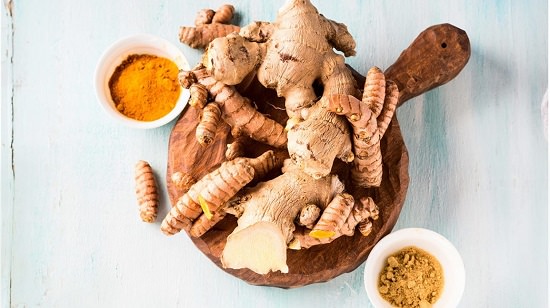Try this turmeric ginger cold remedy while exercising necessary caution to subside your cold symptoms and boost your immunity!

Every one of us has suffered from the common cold at some point in our lives. It is the most common viral infection across the world. For some, it is a seasonal affliction during winter or monsoon seasons. The reason being that in those months, you tend to stay indoors more often and are in close proximity to others. Those at increased risk of catching cold are young children, people with compromised immune systems, smokers, mentally and emotionally stressed individuals, and those who are continuously exposed to crowded environments, like school children or frequent travelers.
The common cold is a contagious, viral infection of the upper respiratory tract. Rhinoviruses are the most common causes (about 80% of colds) of the common cold. The virus is airborne and gains entry into your body through your eyes, mouth, or nose. It remains as droplets in the air when a sick person talks, coughs, or sneezes. It can also infect you when you contact an ill person or touch the articles used by a sick person. Touching the infected item and then touching your eyes, nose, or mouth can infect you. The common cold is usually self-limiting and has no definitive cure or vaccine.
Symptoms of cold:
- Runny or stuffy nose
- Sneezing
- Nasal congestion
- Cough with phlegm
- Fever
- Earache
- Headache
- Body ache
- Sinus pressure
- Swollen lymph nodes
- Sore throat or throat irritation
- Hoarseness of voice
- Loss of appetite
- Fatigue
- Malaise (general feeling of being unwell)
Usually, the viral infection and symptoms last anywhere between 7 -10 days and subside when you take sufficient rest and increase your fluid intake. In general, the common cold does not require antibiotics but can sometimes cause ear infections (otitis media), asthma, sinusitis, or progress to pneumonia. All these complications need medical treatment.
The common points to follow to prevent or alleviate the symptoms of cold:
- Maintaining good hygiene by washing your hands often with soap.
- Disinfecting household articles regularly, making sure that you do not share towels, pillows, etc. with others if you are infected
- Using disposable tissues to cover your mouth when you cough or sneeze
- Taking sufficient rest, and
- Drinking plenty of liquids.
Home Remedies for Cold

- Over the counter medicines like lozenges, cough drops, and throat sprays help relieve the symptoms.
- Drugs like Tylenol and paracetamol help deal with the head and body ache and throat pain.
- Gargling with warm salt water also helps ease a sore throat.
- Taking bed rest and drinking plenty of warm/hot liquids like soups, juices, herbal teas, and milk does help.
- Drinking warm lemon water with honey.
- A mixture of lemon, cinnamon, and raw honey is effective against cough.
- Over the counter saline nasal sprays help deal with nasal congestion.
When to seek medical help?
- If your symptoms don’t subside or get better in 10 days, it is better to seek a doctor’s advice.
- The fever is higher than 101.3F (38.5C).
- Fever is accompanied by shaking and chills.
- You develop vomiting and abdominal pain.
- Neck stiffness is present.
- Breathing difficulty.
- Wheezing is present.
- If you have a severe headache, sore throat, chest pain, or sinus pain.
Turmeric Ginger Cold Remedy

Turmeric and ginger are effective agents in the fight against cold and its symptoms. Ginger is anti-inflammatory and helps to relieve congestion and speeds up the recovery process. It contains chemicals like sesquiterpenes, which help fight upper respiratory tract viruses. It also suppresses coughs and helps reduce pain and Fever.
Turmeric has proven antioxidant and anti-inflammatory properties, which boost immunity and also help reduce swelling in the nasal passages. This enables you to breathe better. It also helps your body naturally cleanse your respiratory tract. 1 tsp of powdered turmeric boiled in milk and consumed at bedtime is beneficial to alleviate the cold symptoms and help you sleep better.
Turmeric ginger tea

What You Need
- 8 ounces hot water
- Juice of ½ lemon
- 1 tbsp raw honey
- 2inch piece grated ginger
- 1 tsp turmeric powder
- ½ tsp powdered cinnamon
- In a saucepan, add the water, ginger, and turmeric and bring it to a boil.
- Cover and let it simmer for 20 minutes.
- Take it off the flame and add lemon juice, honey, and cinnamon.
- Mix well and drink it hot.
Turmeric Ginger Drink for Cold
What You Need
- 2 cups boiling water
- 1 tsp grated ginger
- 2 tsp grated turmeric rhizome
- ½ tsp crushed black pepper
- 1 tbsp raw honey
- Add the turmeric, ginger, and pepper to the boiling water in a saucepan.
- Let the water reduce to half. Strain it and add honey.
- Drink it hot or warm.
Possible side effects of turmeric and ginger:
- Ginger in excess can cause heartburn, diarrhea, affect your heart health, and cause stomach discomfort.
- It is said to increase menstrual bleeding.
- It affects your insulin/blood sugar levels, and if you are on diabetes medication, it is prudent to let your doctor know before you take a high dose of ginger.
- Both turmeric and ginger may interfere with blood clotting in high doses.
- Those with bleeding disorders should exercise caution or take medical advice before consuming them.
- Fresh turmeric rhizome is more potent than its dried powdered form. A teaspoon of turmeric a day is considered safe.
- Turmeric or curcumin can cause gastrointestinal problems, dizziness, nausea, liver problems, gall stones, and kidney stones if consumed in abnormally high amounts.
- It is also found to reduce fertility in men.
Even though you are free to try this turmeric ginger cold remedy, it is advisable to exercise extra caution to avoid the side effects.
